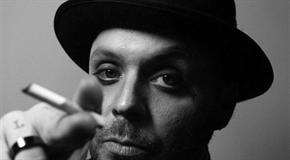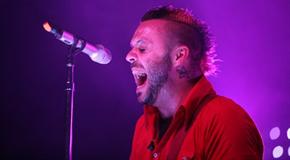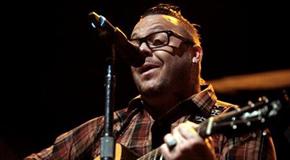Features
Q&A With Blue October’s Justin Furstenfeld
Furstenfeld also talked about his battle against alcoholism and depression, saying he’s a better person today than he was 12 months ago.
Furstenfeld is touring in support of the April 1 release of “Crazy Making,” the expanded third edition of his book of lyrics, hand-written notes, personal photographs and material not included in earlier editions. He told Pollstar that his solo adventure is a way for him to thank fans for supporting him and the band throughout the years.
That is, except for one thing. He’s not too keen about the word “fan.”

Songwriters often talk about how they bare their souls through their music, but you’re actually doing it while talking about your music. Is it difficult putting your personal life out there?
No. It’s what I’ve always done. I always wondered why everybody else didn’t. I always listen to music and think, “Why are they being so vague? Why don’t they just get to the point and tell me the person’s name? What actually happened?”
Ever since I was kid growing up listening to music like Peter Gabriel, Pink Floyd, The Cure … the spectrum of music was pretty all over the place but they were always really, really personal with their lyrics. But still not as personal as I would have liked to have heard. I always wanted to ask them questions – “What did you mean by this?”
So when I started making music I was like, “Why don’t I just spell it out?” Some people say, “Oh, God, it’s so dramatic.” But I guess those are just the people who won’t like our music, or something. But other people say, “I’m glad you said it that way. That’s what I’ve been thinking.”
I’ve never felt odd, talking about it, maybe, but onstage it’s the place where I own it and feel it and am never ashamed of it. Kind of like if they don’t like it they don’t have to be there. I used to be in the acting world. When I was a kid I was in theatre and I always hated auditioning … and waiting [to hear] whether they like me or not.
So I remember making a conscious decision to go into the music world. I didn’t have to ask anymore, I could actually do. So I wouldn’t ever say I feel odd about it. Not at all.
The 2012 European tour as well as the upcoming tour are described as a combination of spoken word, a reading from your book, a Q&A and an acoustic set. How much time to you devote to each element?
Depends on how it feels. I never get enough time to talk to people. I hate calling them “fans.” I like to just call them people who listen to our music and respect us enough to support us. I’ve never taken the time to do something where I can actually get something from them and say, “Well, this is something you’ve always wondered about. Let me go and answer that for you.’
What I’m probably going to do is get a hat and have them ask questions and walk in and draw questions from the hat. Whether or not it’s too personal or not too personal, it doesn’t matter. I’ll answer as honestly as I can. Just talk to them about how the songs came about. The one thing I get from people listening to us is tons and tons of mail … how it affected them and how they … would love to sit and chat [about] how they understand how maybe I got there. Devote the in between times of songs to those things, tell them little stories.
It’s also a chance for me to finally, while Blue October is working on their album, to get this book out. I don’t want to compete with the time dedicated to the new album. We’re going to have two months of downtime and I have a wonderful wife who goes on the road with me. So I was like, “Why don’t we just go on the road and get to know these people more and tell them ‘thank you so much’ for everything they have done for us?” And in return do some shows while we’re out there. Meet with some radio people while we’re out there to make sure we’re all still good with everybody.

While writing the book and gathering material for the tour, did you learn new things about yourself?
This past year I’d have to say, “Yeah.” During the making of Any Man In America I pretty much lost who I was. That whole subject matter of that last album, I’m very proud that I was able to put it out, very proud that I was so honest. But I’m not very proud of where it led me to. I just went crazy. It seemed like the more I spoke about the issue and the more I stepped forward to try to change the issue, the more I just banged my head against the wall. The one thing I learned this past year is that as long as I commit myself and concentrate on being a better person … for the long run, for anyone I care about deeply.
Going off into depression and alcoholism isn’t a very good note for a person. Very quickly I noticed I was kind of falling off of the edge when I was touring for Any Man In America and I wasn’t getting any results in the personal field that actually changed things in the legal system just because I put out an album about it. I thought, for some reason, I’d put the album out and the next thing you know I’d have Congress helping me and … it didn’t work out that way.
I [realized] while gathering material for this new tour, it’s stuff that I never played on a Blue October album. It’s stuff that’s not on any albums. It’s just songs that I always thought were too obscure … too light or too heavy for albums. It’s kind of more … I wouldn’t actually say B-sides to all the babies. All the songs have their own personalities like babies. They’re special and they need to see the light of day. Although not recorded, I’d love to play them for people, live.
Do you establish a line not to cross? Did you go into this saying you would cover every subject except what you might consider to be too personal?
Any subject. I think once I put up a line that’s when I’m being fake. Anything. That’s the whole point of it, really.
With the Q&As plus spoken word and musical performances, are these shows more similar to what monologist Spaulding Gray did or Laurie Anderson has done than a singer/songwriter on a solo tour?
I grew up on performance art – in Houston where art took place, just setting up and playing some acoustic stuff and calling it a night. It’s more about getting real with people and letting them see a side of me that was overshadowed by this whole crazy, stupid rock industry of “Lights! Camera! Now!” It’s more like I’m just a normal dude. I really want to take off my suit, sit in my jeans and sweater and talk to you all about anything you want to talk about. Drug addiction, depression, alcoholism, divorce, custody, happiness, love lost, serenity, peace, madness, anything. Because I know there are people out there who want to talk about that stuff. And for some reason, I’m the person they want to talk to about it, sometimes. It’s not like I have answers, but I sure have stories.
As someone who has built a career communicating with people, do you think you’re better equipped to provide answers for people?
Yeah. Answers, not advice [laughs]. I’ve had people in autograph lines asking what they should do about certain things. And I’m like, “I’m the blind leading the blind here, buddy. I’m looking for answers, too.” But I’m sure able to answer any question anyone has about anything in my life. I’m not ashamed of anything that has happened. I take responsibility and ownership of everything.
Why do you think people still have problems talking about mental illness?
That’s the one thing in life I will always try to understand. I think, in the past I was mostly perceived as someone who is very full of drama and that’s how mental illness was perceived in my life. Except for the people who are actually educated on it and work in the field. But one thing I will say to you is that there is no excuse for people who don’t treat their mental illness. There’s no excuse for that. I’m a firm believer on getting treatment for whatever difficult situation that you have and not being lazy about your situation. Not being, “Oh, it’s just my personality.” Try to be a better person, strive to be a better person every day in your life.
And I didn’t know that until a year ago when I just had to put down the warpath, put down the guns and go, “You know what? I’m not going to change the legal system. I’m a better person for my daughter if I just stop fighting and just show up and be a better person and like myself.”
I take my medication. I go every day seeking the positive. I don’t dwell in the past and the negative. I recognize it and I learn from it. I think mental illness is something that can be treated if you’re willing to work hard at being treated.
Having dealt with your issues, do you now recognize mental illness symptoms in other people and know they could benefit from treatment?
Oh, yeah. And I don’t mean treatment like go to the hospital. I mean treatment as in seeing someone, talk about it, communicate it. Your question was “how come we can’t communicate about mental illness?” I think that’s the main problem, not being able to communicate about it. And people [acting] under the assumption that you’re just nuts. I’ve been labeled that. And I would have to say that during the last two years that maybe I was going a little nuts. … And I went to the first thing – self-medication – in healing when that wasn’t the right thing to do at all. I think there are many people in the music industry, just many people in normal day-to-day life that could benefit from opening up about what’s going on in their lives. The problem is they have to have somebody to open up to.
Do think your mental heath issues have influenced your writings in a good way that you might not have even been aware of at that time when putting pen to paper?
Yes, I do. I think in a way that I could express it. Because if I didn’t have music and didn’t have the ability to write those things down. Given my weakest thoughts, I don’t know if I would have been able to go on with being a person and function in society as a normal person. If I didn’t have this outlet, I wouldn’t have had a purpose. And me not having a purpose would be like being a lost dog.
Regarding the shows you’ve already done, since you don’t know what audience members are going to ask, was each show truly unique?
That was the one thing that was different about it. I don’t like scripting. Rock shows? Hell, yeah. You have to script it down to the light cues. But this is, you have your 25 songs that you’re going to play and you have your subject matter between those, and the rest is up to the audience and how deep they want to go. I’m not going to go, “Hey! Guess what? Bleah …” You know what I’m saying? I’ve already done enough of that. I want this to be their will. I’ve already gone, “Here, let just vomit all over your emotions on these last six albums.” Now is the time I can actually own up and go, “What do you all think?” And if they have a certain question, they can ask as stupid as they want.
That’s what I loved about doing it in Europe. They hardly know me very well. When I was there it was a different show every night. I could play off of the audience. “This is a somber mood. Let me go into this song, now.” Just have a list of 40-to-50 songs that I can choose from every night, that they’ve never heard before. Then drop in an acoustic version of “Hate Me” just because they’re going to want to hear it. Then drop in two new songs from the brand new album that I’m super proud of. They’re a completely different side of me, of someone who is happy and has found the light at the end of the tunnel. For today. I’m very, very hopeful that it will be nice and different every single night. I love the unexpected. You never know what’s going to happen at these kind of shows.
If we were to ask someone who has been with you these last few years about the biggest change in your life, what do you think that person would say?
He loves himself. The last 10 months I’ve been able to understand what’s important. And that’s not me. I’m not the only thing in this world. I’m not the only thing that’s going on. There are other people around me. Because of that and because of things I can admit that I’ve done wrong and because of the amends I can make and because of the fact that I don’t have to live my life by dragging this ship. I have a higher power who runs this ship. The fact that I can actually sit back and go, “You’re a good person, Justin. Stop giving yourself such a fucking hard time. Stop being so over dramatic about everything that goes on in your life. Everybody’s got problems, bro.” The fact that I can notice that and recognize that makes me love myself. That might sound odd, but I like being able to like myself. So my kids can see that in my eyes instead of self-hatred.
You’ve done some acting. When Hollywood does your life story, who do you think should portray you?
Giovanni Ribisi. He was in “Contraband” with Mark Wahlberg. He was in that movie with Nic Cage who steals all the cars with Angelina Jolie – “Gone In 60 Seconds.” And he’s the little brother who’s always in trouble, who’s always fucking up. Check out the guy from “Contraband.” He’s the bad guy, a drug-dealer guy. He’s got a sweet soul but there’s something I like about him, you just wouldn’t want to fuck with. He just might pop any second.

Upcoming dates for “An Open Book: An Evening With Justin Furstenfeld” include April 4 in Hollywood at Hotel Café; April 5 in Santa Ana, Calif., at The Observatory; April 6 in Scottsdale, Ariz., at Talking Stick Resort; April 7 in Las Vegas at Vinyl @ Hard Rock Hotel; April 10 in Englewood, Calif., at Gothic Theatre and April 12 in Minneapolis at Mill City Nights.